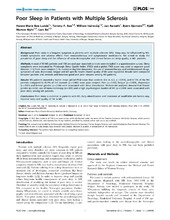| dc.contributor.author | Lunde, Hanne Marie Bøe | en_US |
| dc.contributor.author | Aae, Tommy F. | en_US |
| dc.contributor.author | Indrevåg, William | en_US |
| dc.contributor.author | Aarseth, Jan Harald | en_US |
| dc.contributor.author | Bjorvatn, Bjørn | en_US |
| dc.contributor.author | Myhr, Kjell-Morten | en_US |
| dc.contributor.author | Bø, Lars | en_US |
| dc.date.accessioned | 2013-04-12T10:20:36Z | |
| dc.date.available | 2013-04-12T10:20:36Z | |
| dc.date.issued | 2012-11-14 | eng |
| dc.Published | PLoS ONE 7(11): e49996 | eng |
| dc.identifier.issn | 1932-6203 | |
| dc.identifier.uri | https://hdl.handle.net/1956/6512 | |
| dc.description.abstract | Background: Poor sleep is a frequent symptom in patients with multiple sclerosis (MS). Sleep may be influenced by MS-related symptoms and adverse effects from immunotherapy and symptomatic medications. We aimed to study the prevalence of poor sleep and the influence of socio-demographic and clinical factors on sleep quality in MS- patients. Methods: A total of 90 MS patients and 108 sex-and age- matched controls were included in a questionnaire survey. Sleep complaints were evaluated by Pittsburgh Sleep Quality Index (PSQI) and a global PSQI score was used to separate good sleepers (≤5) from poor sleepers (>5). Excessive daytime sleepiness, the use of immunotherapy and antidepressant drugs, symptoms of pain, depression, fatigue and MS-specific health related quality of life were registered. Results were compared between patients and controls and between good and poor sleepers among MS patients. Results: MS patients reported a higher mean global PSQI score than controls (8.6 vs. 6.3, p = 0.001), and 67.1% of the MS patients compared to 43.9% of the controls (p = 0.002) were poor sleepers. Pain (p = 0.02), fatigue (p = 0.001), depression (p = 0.01) and female gender (p = 0.04) were associated with sleep disturbance. Multivariate analyses showed that female gender (p = 0.02), use of immunotherapy (p = 005) and a high psychological burden of MS (p = 0.001) were associated with poor sleep among MS patients. Conclusions: Poor sleep is common in patients with MS. Early identification and treatment of modifiable risk factors may improve sleep and quality of life in MS. | en_US |
| dc.language.iso | eng | eng |
| dc.publisher | Public Library of Science | eng |
| dc.rights | Attribution CC BY | eng |
| dc.rights.uri | http://creativecommons.org/licenses/by/2.5/ | eng |
| dc.title | Poor Sleep in Patients with Multiple Sclerosis | en_US |
| dc.type | Peer reviewed | |
| dc.type | Journal article | |
| dc.description.version | publishedVersion | en_US |
| dc.rights.holder | Copyright 2012 Bøe Lunde et al. | |
| dc.identifier.doi | https://doi.org/10.1371/journal.pone.0049996 | |
| dc.identifier.cristin | 1017521 | |

